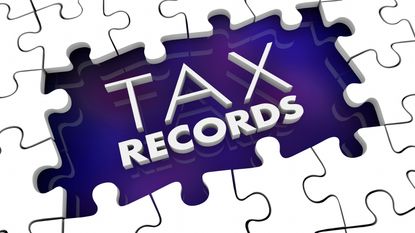
Keep your tax records at least until the time limit for an audit runs out — and even longer for some records.
When you purchase through links on our site, we may earn an affiliate commission. Here’s how it works.

Tax season is almost over, but don't shred your tax records once Tax Day has passed. You might need those forms, receipts, canceled checks and other documents later. The IRS generally has three years after the due date of your return (or the date you file it, if later) to kick off an audit, so you should save all your tax records at least until that time has passed. But you should keep some documents even longer, and it's also a good idea to save copies of the tax return itself indefinitely.
It's also a good idea to think about keeping certain documents for non-tax purposes. For instance, it might be wise to save W-2 forms until you start receiving Social Security benefits so you can verify your income if there's a problem.
Here's some information on how long you should keep certain common tax records and documents.
Be a smarter, better informed investor.
Save up to 74%
Profit and prosper with the best of expert advice on investing, taxes, retirement, personal finance and more - straight to your e-mail.
Profit and prosper with the best of expert advice - straight to your e-mail.
Generally speaking, you should save documents that support any income and tax deductions and credits claimed on your tax return for at least three years after the tax-filing deadline.
If, like most people, you don't itemize deductions on Schedule A, you might not need to save as many documents. For example, if you are not deducting charitable contributions, then you don't need to keep donation receipts or canceled checks for tax purposes.
The IRS has up to six years to initiate an audit if you've neglected to report at least 25% of your income.
For self-employed people, who may receive multiple 1099s, it isn't difficult to overlook reporting some income. To be on the safe side, they should generally keep their 1099s, receipts and other records of business expenses for at least six years.
If you don't report $5,000 or more of income attributable to foreign financial assets, the IRS also has six years from the date you filed the return to assess tax on that income. So, save any tax records related to such income until the six-year window is closed.
Sometimes your stock picks don't turn out so well, or you loan money to someone who doesn't pay you back. If that's the case, you might be able to write off your worthless securities or bad debts. But make sure you keep related records and documents for at least seven years. That's how much time you have to claim a bad debt deduction or a loss from worthless securities.
(Note: Loaning money is considered a gift if you knew the person may not pay you back. Gifts are not tax-deductible, so you can't write these off as bad debts.)
If you paid taxes to a foreign government, you may be entitled to a credit or deduction on your U.S. tax return. You typically have up to 10 years to claim the Foreign Tax Credit, so you should save any tax records or documents related to foreign taxes paid for at least 10 years.
When it comes to investments and your property, you will need to save some records for at least three years after you sell. For instance, you should keep records of contributions to a Roth IRA for three years after the account is emptied.
You will need these records to show that you already paid taxes on the contributions and shouldn't be taxed on them again when the money is withdrawn.
Even if your broker is required to report the cost basis, it is a good idea to keep copies of these records yourself. (If you inherit stocks or funds, keep records of the value on the day the original owner died to help calculate the basis when you sell the investment.)
If you inherit property or receive it as a gift, make sure you keep documents and records for at least three years after you dispose of the property. Income from selling property is considered taxable if sold for more than your basis in the property.
Keep home sale and improvement receipts and documents for three years after you've sold the home. Most people don't have to pay capital gains tax on home sale profits.
But if you sell the house before then or if your gains are larger, you will need to have your home purchase records. Save receipts for home improvements, too. They can increase your adjusted basis (cost of acquiring the home, plus cost of improvements, less casualty losses), which can help reduce your tax liability. Similar rules apply to any rental property you own.
Save records for at least three years after selling the property.
Don't forget to check your state's tax record retention recommendations, too. The tax agency in your state might have more time to audit your state tax return than the IRS has to audit your federal return. For instance, the California Franchise Tax Board has up to four years to audit state income tax returns, so California residents should save related tax records for at least that long.
Profit and prosper with the best of Kiplinger's advice on investing, taxes, retirement, personal finance and much more. Delivered daily. Enter your email in the box and click Sign Me Up.
By submitting your information you agree to the Terms & Conditions and Privacy Policy and are aged 16 or over.
Rocky Mengle was a Senior Tax Editor for Kiplinger from October 2018 to January 2023 with more than 20 years of experience covering federal and state tax developments. Before coming to Kiplinger, Rocky worked for Wolters Kluwer Tax & Accounting, and Kleinrock Publishing, where he provided breaking news and guidance for CPAs, tax attorneys, and other tax professionals. He has also been quoted as an expert by USA Today, Forbes, U.S. News & World Report, Reuters, Accounting Today, and other media outlets. Rocky holds a law degree from the University of Connecticut and a B.A. in History from Salisbury University.

5 Stocks to Buy for a Trump Presidency The race for the White House is heating up and these five stocks are set to benefit if Donald Trump claims victory. By Will Ashworth Published 7 September 24

6 Target-Date Funds to Buy For Your Retirement These six target-date funds are good set-it-and-forget-it options that are a staple of retirement plans. By Nellie S. Huang Published 7 September 24

What Time is the Mega Millions Drawing? Lottery Tax With a high-stakes lottery jackpot, the payout (less some tax) is anyone’s to win. By Kate Schubel Last updated 7 September 24

IRS Back Taxes Scam Call Steals Millions Scams IRS fakes are cheating thousands of people out of “overdue tax debt.” Are you next? By Kate Schubel Last updated 3 September 24

Unrealized Gains Tax: One Important Thing to Know Now Capital Gains Unrealized capital gains have taken center stage in election discussions about tax fairness and economic policy. By Kelley R. Taylor Last updated 3 September 24

IRS: How to Get a 401(k) Match for Your Student Loan Payment Savings Those with 401(k), 403(b), and other savings plans might get relief through their employer-provided retirement account. By Kate Schubel Published 26 August 24

Kamala Harris Golf Tax and Unrealized Gains? What You Really Need to Know Election 2024 There's a lot of social media talk about capital gains taxes and a golf tax. How much is real? By Kelley R. Taylor Last updated 27 August 24

How Much Is the Child Tax Credit for 2024? Tax Credits The refundable amount of this tax break is slightly higher for the 2025 tax filing season. Here’s what you need to know. By Gabriella Cruz-Martínez Last updated 25 August 24

IRS Urges Employers to Participate in ERC Voluntary Disclosure Program Tax Credits Businesses can fix ERC claims with the IRS at a lower cost, but only for a limited time. By Gabriella Cruz-Martínez Published 21 August 24

New Jersey Residents to Receive ANCHOR Direct Deposit or Checks in Mail Tax Relief NJ is sending millions in property tax relief — find out when and how much could hit your wallet. By Kate Schubel Last updated 6 September 24
Kiplinger is part of Future plc, an international media group and leading digital publisher. Visit our corporate site.
© Future US, Inc. Full 7th Floor, 130 West 42nd Street, New York, NY 10036.